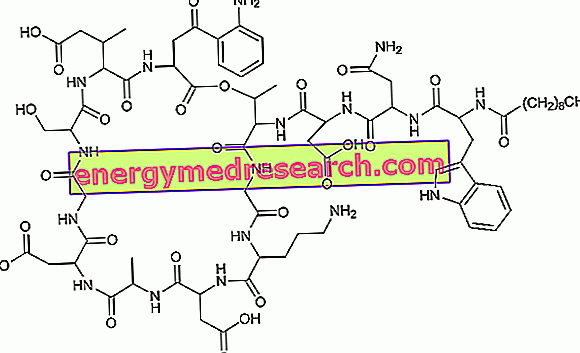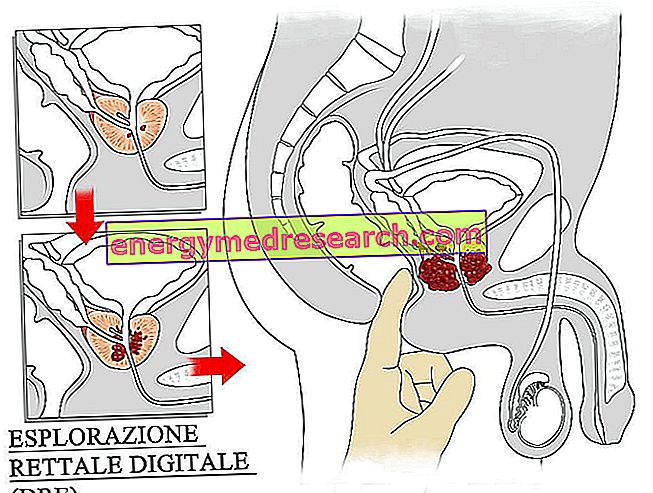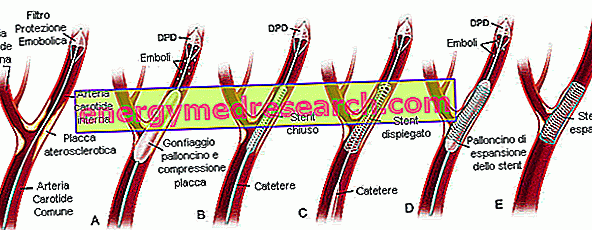Daptomycin is a cyclic lipopeptide of natural origin with an antibiotic action, obtained by fermentation with Streptomyces roseosporus .
It has a spectrum of action restricted mainly to Gram-positive bacteria and has a bactericidal antibiotic action (ie it is able to kill bacterial cells).

Vancomycin - Chemical Structure
Indications
For what it uses
Daptomycin is indicated for the treatment of:
- Skin and subcutaneous tissue infections;
- Infections of the tissues that cover the heart caused by Staphylococcus aureus ;
- Blood infections caused by Staphylococcus aureus when associated with skin and subcutaneous tissue infections or cardiac infections.
Warnings
In patients with kidney disease, the doctor may decide to give lower doses of daptomycin than those normally used.
Before starting treatment with daptomycin and for the duration of the treatment, it is necessary to check the condition of the patients' muscles through appropriate blood tests.
In the event of muscular pain or weakness, it is necessary to inform the doctor, as it may be necessary to carry out blood tests to check whether or not it is necessary to continue the treatment with the antibiotic.
In overweight patients, blood levels of daptomycin may be higher than those found in normopathic individuals, therefore, this category of patients should be regularly monitored.
Daptomycin may alter the results of laboratory tests performed to measure blood clotting.
If - during treatment with daptomycin - any of the following symptoms appear, you should inform your doctor immediately:
- Acute and severe allergic reactions;
- Abnormal tingling or numbness in the hands and / or feet;
- Loss of sensitivity or difficulty in movement;
- Diarrhea, especially if accompanied by blood or mucus or if the diarrhea is severe and persistent;
- Appearance or worsening of fever, cough and difficulty breathing; these symptoms could in fact be signs of the onset of eosinophilic pneumonia.
The use of daptomycin in children and adolescents under 18 years of age should not be performed.
Interactions
Concomitant use of daptomycin and the following medicinal products may increase the risk of toxicity of the muscles:
- Statins (drugs used in the treatment of hypercholesterolemia);
- Fibrates (other drugs used in the treatment of hypercholesterolemia);
- Ciclosporina (an immunosuppressive drug used in the prevention of rejection in transplants).
If you are already taking these drugs, your doctor may decide not to prescribe daptomycin.
Also, due to the possible interactions that may occur, you must inform your doctor if you are taking:
- NSAIDs (non-steroidal anti-inflammatory drugs);
- Selective inhibitors of COX-2 (other non-steroidal anti-inflammatory drugs);
- Oral anticoagulants, such as warfarin.
In any case, it is necessary to inform the doctor if you are taking - or if you have recently been taken - drugs of any kind, including over-the-counter medicines and herbal and / or homeopathic products.
Side effects
Daptomycin can cause various side effects, although not all patients experience them. The type of adverse effects and the intensity with which they occur vary according to the different sensitivity that each individual has towards the drug.
The following are the main side effects that may occur during therapy with daptomycin.
Allergic reactions
Daptomycin can trigger allergic reactions, even serious ones, in sensitive individuals. These reactions can occur with:
- Drug rash with eosinophilia and systemic symptoms (also known as DRESS);
- Angioedema;
- Anaphylaxis.
Skin and subcutaneous tissue disorders
Treatment with daptomycin can cause rashes with blistering that can also involve the mouth and genitals or rash accompanied by itching.
Nervous system disorders
Daptomycin therapy may cause:
- dizziness;
- Headache;
- Fatigue;
- Fatigue;
- Asthenia;
- Tremors;
- Tingling or numbness in hands and feet;
- Alterations in the sense of taste;
- Decreased appetite;
- Fatigue;
- Difficulty in falling asleep;
- Anxiety.
Musculoskeletal disorders
Treatment with daptomycin may cause:
- Unexplained muscle pain or weakness;
- Pain in arms or legs;
- Myositis (inflammation of the muscles);
- Joint pain;
- Rhabdomyolysis, ie the destruction of the cells that make up the skeletal musculature, with consequent release into the bloodstream of the substances contained within the musculature itself. All this could then cause kidney damage.
Cardiovascular disorders
Daptomycin therapy can cause pain or tightness in the chest; acceleration of heart rate or weak heartbeat, flushing, fainting, hypotension or hypertension and changes in heart rhythm.
Blood and lymphatic system disorders
Treatment with daptomycin may cause:
- Anemia;
- Increased number of platelets in the bloodstream;
- Increased blood levels of certain types of white blood cells;
- Increased bleeding time;
- Saline imbalance;
- Prothrombin time extension.
Lung and respiratory tract disorders
Daptomycin therapy can cause:
- Swelling around the throat;
- Wheezing breath;
- Eosinophilic pneumonia, a rare but serious condition, characterized by difficulty breathing, cough and fever.
Gastrointestinal disorders
During treatment with daptomycin, nausea, vomiting, diarrhea or constipation, pain, swelling or abdominal tension, dyspepsia and flatulence may occur.
Kidney and urinary tract disorders
Treatment with daptomycin may promote the appearance of urinary tract infections and kidney problems.
Other side effects
Other side effects that may occur during treatment with daptomycin are:
- Temperature;
- Chills;
- Oral candidiasis (thrush);
- Pain or redness at the infusion site;
- Increased blood levels of creatine phosphokinase, liver enzymes, sugars, creatinine, myoglobin or lactate dehydrogenase;
- Jaundice;
- Inflammation and vaginal irritation;
- Colitis or pseudomembranous colitis.
Action mechanism
Daptomycin exerts its bactericidal action by binding to bacterial cell membranes.
The binding of daptomycin induces depolarization of the cell membrane. This depolarization - in turn - activates the mechanisms that lead to the arrest of protein synthesis and the synthesis of RNA and DNA.
By interrupting these fundamental processes, the bacterial cells undergo certain death.
Mode of Use - Posology
Daptomycin is available for intravenous administration in the form of a powder that must be dissolved in a suitable solvent just before its use.
Daptomycin is generally administered by a doctor or nurse by intravenous injection or infusion. The infusion usually lasts about thirty minutes.
The dose of antibiotic to be administered must be established by the doctor according to the severity of the infection to be treated and according to the patient's body weight.
The duration of treatment, instead, is established by the doctor depending on the type of infection to be treated.
Patients with kidney problems may receive a lower dose of daptomycin than is usually administered.
The dose of daptomycin usually given in adult patients and in elderly patients who do not have kidney problems, is 4 mg / kg of body weight per day for skin infections, or 6 mg / kg of body weight per day for heart infections or blood.
Pregnancy and breastfeeding
Usually, daptomycin is not given to pregnant women.
Furthermore, since the drug is excreted in breast milk and may have effects on the newborn, it is advisable not to breast-feed while being treated with the antibiotic.
However, pregnant women and breastfeeding mothers should always seek medical advice before taking any medication.
Contraindications
The use of daptomycin is contraindicated in patients with known hypersensitivity to daptomycin itself.



